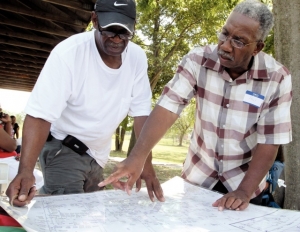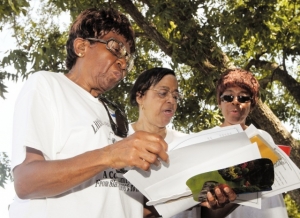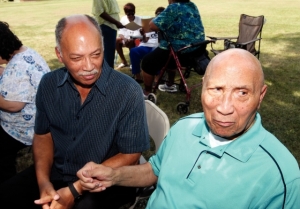Neighbors, friends, always -- in Little Washington
By Steve Herring
Published in News on September 2, 2012 1:50 AM

News-Argus/TROY HERRING
Duncan Jackson, left, and Paul Scherard Jr. look over a copy of an old map of Goldsboro from 1924 at the Little Washington Reunion. The highlight of the afternoon was the honoring of Amaziah Howell Jr. and the late Jacob Musgrave, two of the city's first black police officers.

News-Argus/TROY HERRING
From left, Edith Ward, Ruby Hudson, and Debbie Graham sing a hymn during the 10th annual Little Washington Reunion held at H.V. Brown Park Saturday afternoon.

News-Argus/TROY HERRING
Amaziah Howell Jr., right, sits and chats alongside his son, Amaziah Howell III.
Urban renewal projects might have erased the face of the Little Washington community, but it did not dim the memories of the people who grew up there -- recollections they want to pass on to future generations.
So the 10th annual Little Washington Reunion, held Saturday at H.V. Brown Park, like the ones before it, was about much more than good food and fellowship.
It was, organizers say, a way to keep alive the memories and spirit of a community that ran from U.S. 117 South to Center Street and from Miller Avenue to Elm Street, and that was for all practical purposes, a city inside the city of Goldsboro.
It was a community of doctors, lawyers, funeral homes, grocery stores, schools, clubs, fish markets, insurance offices and even a hotel.
All of that changed when urban renewal projects in the 1970s left only the history and memories of the once thriving black community.
Those who gathered Saturday say they want the younger generation to know that there was no need for amber alerts when they growing up -- people in the community looked after each others' children, and, if necessary, meted out discipline.
And they want them to remember history-makers like the late Jacob A. Musgrave Sr. and Amaziah Howell Jr., the city's first two black police officers, both of whom came from the Little Washington area.
Doretha Reid Macklin, who grew up on Canal Street, has been a moving force behind the annual reunions.
"There was a sandhole down there," she said. "We played in it. There was a cemetery. The mulberry trees, we ate out of them. We stayed here until we moved to Persimmons Street just before the urban renewal projects. I was married by the time they destroyed the Little Washington area."
So even if she could not preserve the neighborhood, Mrs. Macklin said she decided to keep the connections.
"I wanted to do something and bring the people together and have a reunion," she said. "It stayed on my heart for about three or four years before I did it."
People who had moved away told her they would come back for the gathering if she would start the reunion, and they did.
"It has been a blessing to every one of us," she said. "They had more in Little Washington than they did in Goldsboro. We had a lot of stuff. It made our hearts sad when they destroyed it. Maybe the young people coming behind us, maybe they will keep it going. We have young people coming, but it is mostly the people who lived down here. I have told my children that when I am gone that they be sure to keep the memories going so they can have something to tell their children."
Sandra G. Coley, 52, who calls herself a "Little Washington Baby Boomer," has compiled a history of the community. It is available at the Wayne County Public Library and the Wayne County Museum.
Howell, whose steady gait, quick wit and sharp memory, belie his 90 years, was honored at Saturday's event -- something he said he had been trying to avoid for the past several years. Tribute also was paid to Musgrave's family.
This time, Amaziah, who is modest about his accomplishments, said he had no choice. His son, Amaziah Howell III, flew in from New York Saturday morning and brought him to the park.
"I can't hardly take it," he said of the honor. "They asked me about this for several years and I just turned them down. I don't know how I got into it today. They did something. I think my son here had something to do with it. He does those kind of things."
Amaziah, who grew up in the Rosewood area and later moved to the Little Washington community, said it made him feel good to see the turnout.
An Army veteran who served in Germany during World War II, Amaziah had not planned on becoming a police officer.
"The local community asked me if I would let my name go in to be an officer," he said.
Before he could be considered, Amaziah was drafted and served two years.
"I came back and the first thing they approached me with was, 'You know you promised us,'" he said. "That just started the horse to running there."
He served on the police force from 1949 to 1959.
"It was an experience that we had no training in," he said. "The older officers began putting us through training courses. I was assigned a section of Goldsboro, and it was the Little Washington section because that is where the happenings were. Anything happening in Goldsboro, seemed like it was happening in Little Washington."
Amaziah said he worked the James Street area that was especially busy on weekends.
"I don't know what happened, but it seemed like everybody came to town on Friday and Saturday," he said. That street was so full, it was like a circus -- every week, winter and summer. Those men who worked on the farm came to Goldsboro. We'd have all kind of things. People would get drunk. They would get mad and fight.
"Along then the moonshine stuff, white lightening they called it, boy, that was some tough stuff. Most folks knew how to get it. We'd see the cars come in and the guys would say, 'Hey. See that car sitting there? Man he is loaded.'"
Amaziah said officers would start toward the car and the person would jump in the car and take off.
"Sometimes we could catch them, sometimes we couldn't," he said.
